Effectiveness of Policies and Equality Provision Benefits: NHS Report
VerifiedAdded on 2023/01/20
|10
|2831
|64
Report
AI Summary
This report analyzes the effectiveness of equality policies within the National Health Service (NHS). It begins by describing the development of organizational policies, emphasizing the role of legislation and trade unions in ensuring fair practices. The report then examines how equality, diversity, and fair treatment benefit the work of public services, referencing the Equality Act 2010 and the NHS's commitment to addressing health inequalities. The impact of organizational policies on employment, the need for equality, diversity, and fair treatment, and the evaluation of legislation and working practices are also reviewed. The report highlights the importance of advisory services in guiding public organizations on equality matters, emphasizing the benefits of a diverse workforce and equal opportunities. The conclusion summarizes the key findings and emphasizes the importance of these policies in promoting a fair and effective public service.
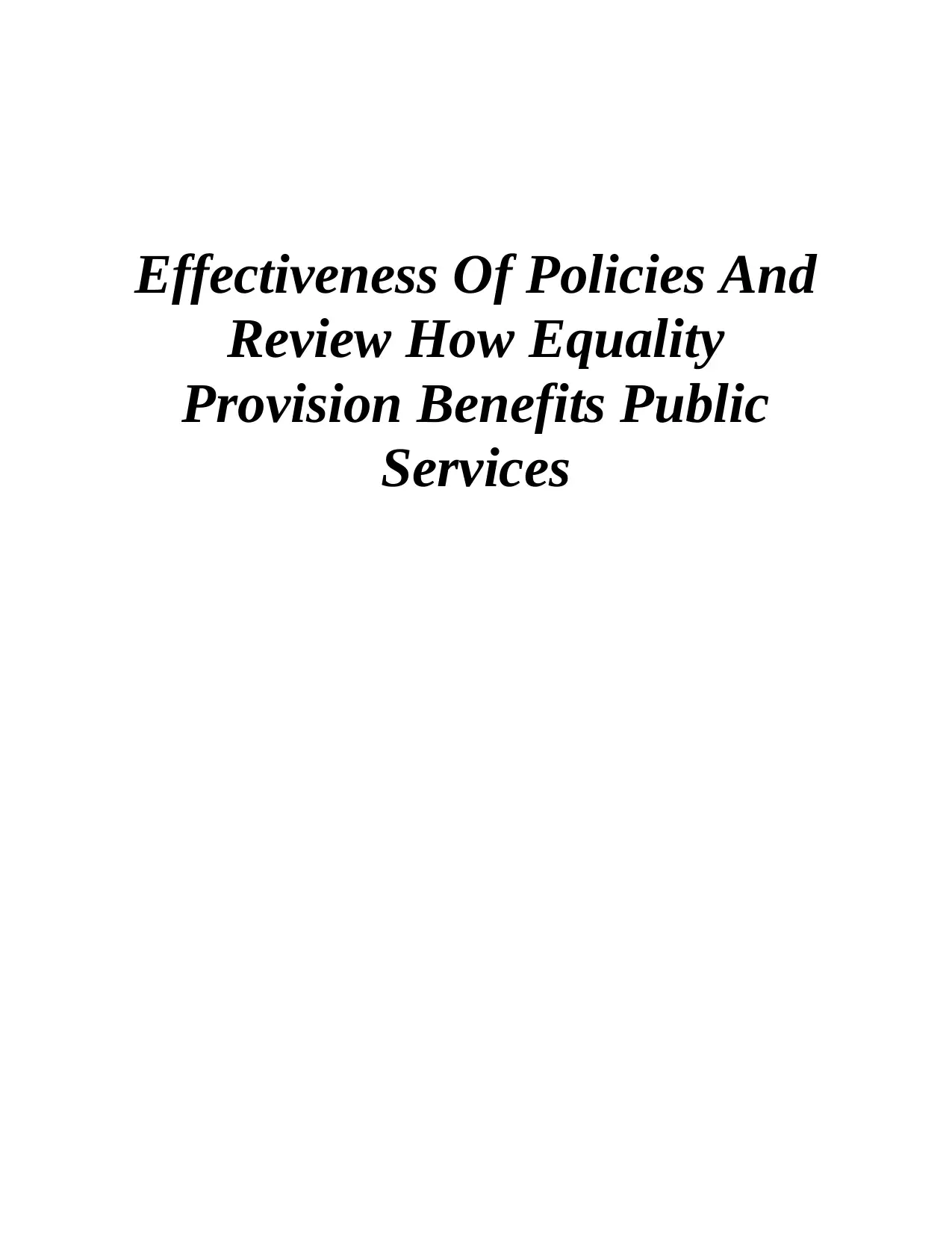
Effectiveness Of Policies And
Review How Equality
Provision Benefits Public
Services
Review How Equality
Provision Benefits Public
Services
Paraphrase This Document
Need a fresh take? Get an instant paraphrase of this document with our AI Paraphraser
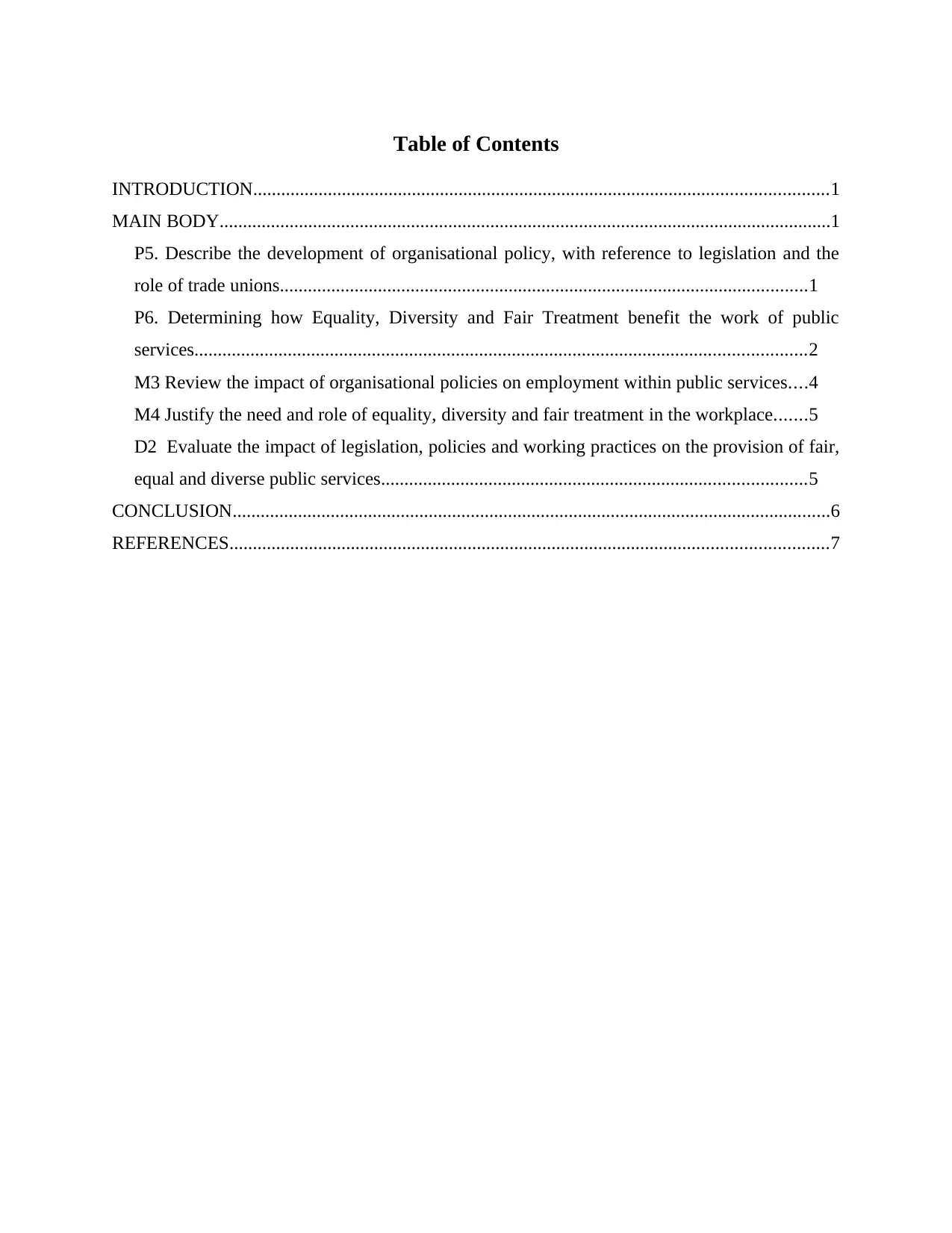
Table of Contents
INTRODUCTION...........................................................................................................................1
MAIN BODY...................................................................................................................................1
P5. Describe the development of organisational policy, with reference to legislation and the
role of trade unions.................................................................................................................1
P6. Determining how Equality, Diversity and Fair Treatment benefit the work of public
services...................................................................................................................................2
M3 Review the impact of organisational policies on employment within public services....4
M4 Justify the need and role of equality, diversity and fair treatment in the workplace.......5
D2 Evaluate the impact of legislation, policies and working practices on the provision of fair,
equal and diverse public services...........................................................................................5
CONCLUSION................................................................................................................................6
REFERENCES................................................................................................................................7
INTRODUCTION...........................................................................................................................1
MAIN BODY...................................................................................................................................1
P5. Describe the development of organisational policy, with reference to legislation and the
role of trade unions.................................................................................................................1
P6. Determining how Equality, Diversity and Fair Treatment benefit the work of public
services...................................................................................................................................2
M3 Review the impact of organisational policies on employment within public services....4
M4 Justify the need and role of equality, diversity and fair treatment in the workplace.......5
D2 Evaluate the impact of legislation, policies and working practices on the provision of fair,
equal and diverse public services...........................................................................................5
CONCLUSION................................................................................................................................6
REFERENCES................................................................................................................................7

⊘ This is a preview!⊘
Do you want full access?
Subscribe today to unlock all pages.

Trusted by 1+ million students worldwide
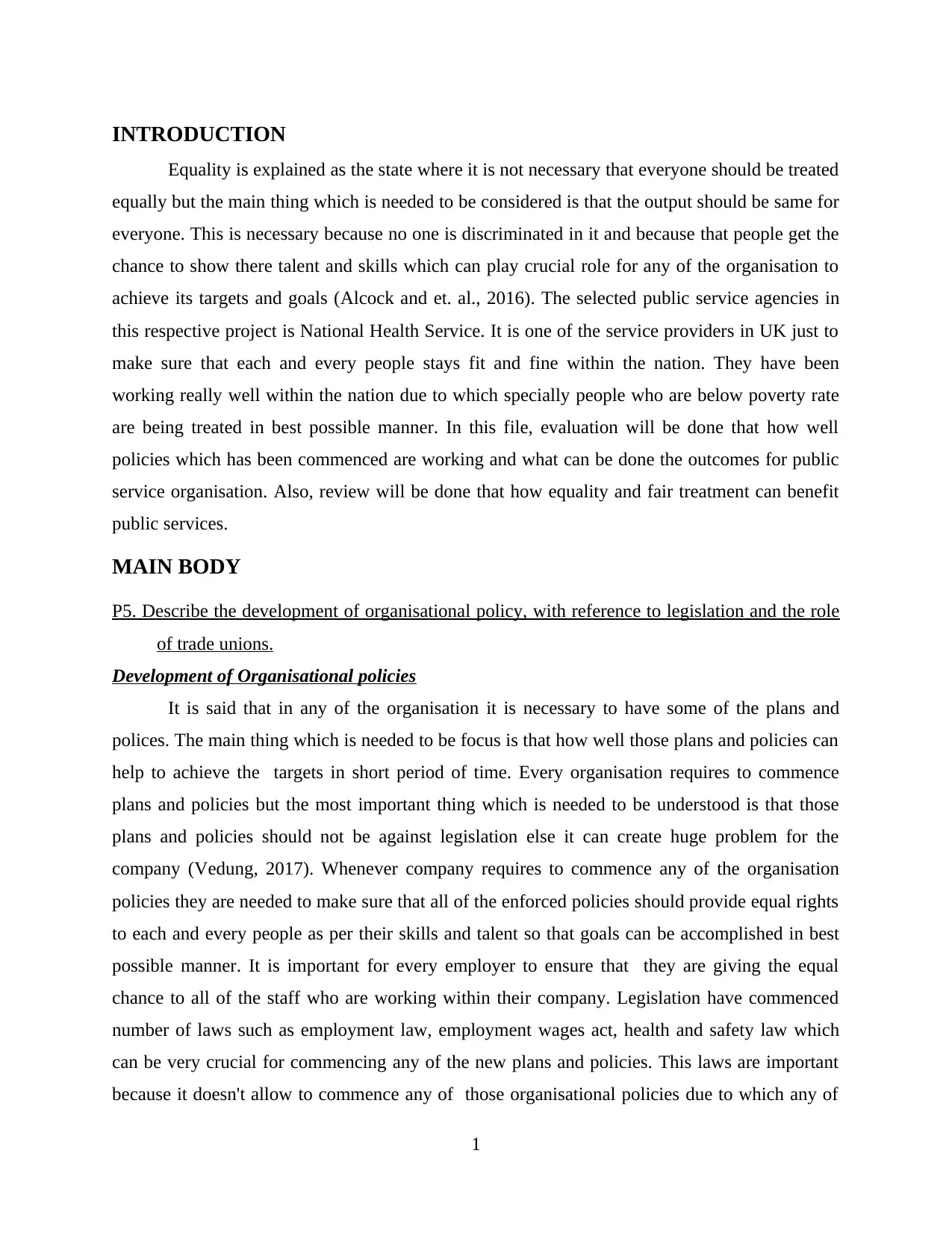
INTRODUCTION
Equality is explained as the state where it is not necessary that everyone should be treated
equally but the main thing which is needed to be considered is that the output should be same for
everyone. This is necessary because no one is discriminated in it and because that people get the
chance to show there talent and skills which can play crucial role for any of the organisation to
achieve its targets and goals (Alcock and et. al., 2016). The selected public service agencies in
this respective project is National Health Service. It is one of the service providers in UK just to
make sure that each and every people stays fit and fine within the nation. They have been
working really well within the nation due to which specially people who are below poverty rate
are being treated in best possible manner. In this file, evaluation will be done that how well
policies which has been commenced are working and what can be done the outcomes for public
service organisation. Also, review will be done that how equality and fair treatment can benefit
public services.
MAIN BODY
P5. Describe the development of organisational policy, with reference to legislation and the role
of trade unions.
Development of Organisational policies
It is said that in any of the organisation it is necessary to have some of the plans and
polices. The main thing which is needed to be focus is that how well those plans and policies can
help to achieve the targets in short period of time. Every organisation requires to commence
plans and policies but the most important thing which is needed to be understood is that those
plans and policies should not be against legislation else it can create huge problem for the
company (Vedung, 2017). Whenever company requires to commence any of the organisation
policies they are needed to make sure that all of the enforced policies should provide equal rights
to each and every people as per their skills and talent so that goals can be accomplished in best
possible manner. It is important for every employer to ensure that they are giving the equal
chance to all of the staff who are working within their company. Legislation have commenced
number of laws such as employment law, employment wages act, health and safety law which
can be very crucial for commencing any of the new plans and policies. This laws are important
because it doesn't allow to commence any of those organisational policies due to which any of
1
Equality is explained as the state where it is not necessary that everyone should be treated
equally but the main thing which is needed to be considered is that the output should be same for
everyone. This is necessary because no one is discriminated in it and because that people get the
chance to show there talent and skills which can play crucial role for any of the organisation to
achieve its targets and goals (Alcock and et. al., 2016). The selected public service agencies in
this respective project is National Health Service. It is one of the service providers in UK just to
make sure that each and every people stays fit and fine within the nation. They have been
working really well within the nation due to which specially people who are below poverty rate
are being treated in best possible manner. In this file, evaluation will be done that how well
policies which has been commenced are working and what can be done the outcomes for public
service organisation. Also, review will be done that how equality and fair treatment can benefit
public services.
MAIN BODY
P5. Describe the development of organisational policy, with reference to legislation and the role
of trade unions.
Development of Organisational policies
It is said that in any of the organisation it is necessary to have some of the plans and
polices. The main thing which is needed to be focus is that how well those plans and policies can
help to achieve the targets in short period of time. Every organisation requires to commence
plans and policies but the most important thing which is needed to be understood is that those
plans and policies should not be against legislation else it can create huge problem for the
company (Vedung, 2017). Whenever company requires to commence any of the organisation
policies they are needed to make sure that all of the enforced policies should provide equal rights
to each and every people as per their skills and talent so that goals can be accomplished in best
possible manner. It is important for every employer to ensure that they are giving the equal
chance to all of the staff who are working within their company. Legislation have commenced
number of laws such as employment law, employment wages act, health and safety law which
can be very crucial for commencing any of the new plans and policies. This laws are important
because it doesn't allow to commence any of those organisational policies due to which any of
1
Paraphrase This Document
Need a fresh take? Get an instant paraphrase of this document with our AI Paraphraser
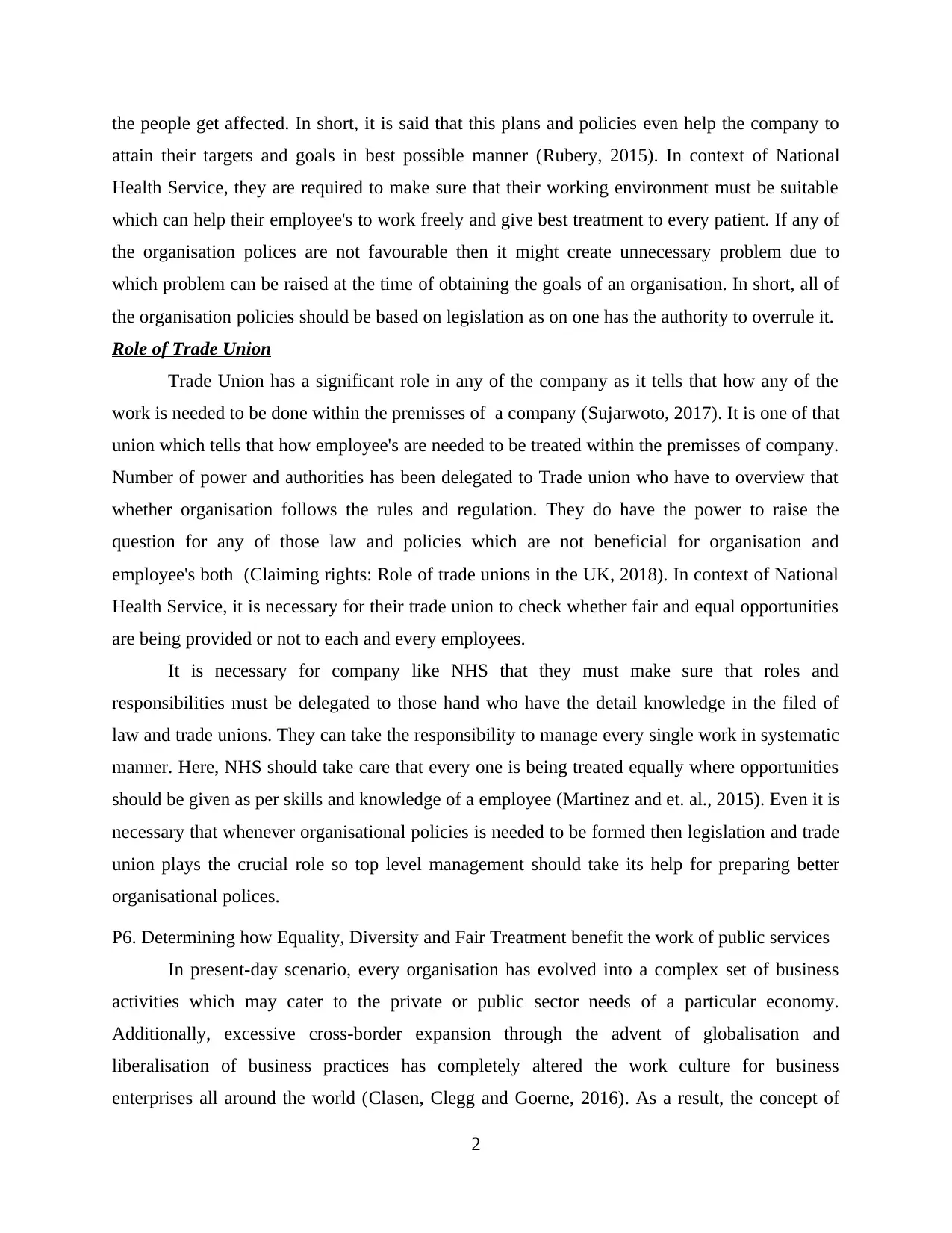
the people get affected. In short, it is said that this plans and policies even help the company to
attain their targets and goals in best possible manner (Rubery, 2015). In context of National
Health Service, they are required to make sure that their working environment must be suitable
which can help their employee's to work freely and give best treatment to every patient. If any of
the organisation polices are not favourable then it might create unnecessary problem due to
which problem can be raised at the time of obtaining the goals of an organisation. In short, all of
the organisation policies should be based on legislation as on one has the authority to overrule it.
Role of Trade Union
Trade Union has a significant role in any of the company as it tells that how any of the
work is needed to be done within the premisses of a company (Sujarwoto, 2017). It is one of that
union which tells that how employee's are needed to be treated within the premisses of company.
Number of power and authorities has been delegated to Trade union who have to overview that
whether organisation follows the rules and regulation. They do have the power to raise the
question for any of those law and policies which are not beneficial for organisation and
employee's both (Claiming rights: Role of trade unions in the UK, 2018). In context of National
Health Service, it is necessary for their trade union to check whether fair and equal opportunities
are being provided or not to each and every employees.
It is necessary for company like NHS that they must make sure that roles and
responsibilities must be delegated to those hand who have the detail knowledge in the filed of
law and trade unions. They can take the responsibility to manage every single work in systematic
manner. Here, NHS should take care that every one is being treated equally where opportunities
should be given as per skills and knowledge of a employee (Martinez and et. al., 2015). Even it is
necessary that whenever organisational policies is needed to be formed then legislation and trade
union plays the crucial role so top level management should take its help for preparing better
organisational polices.
P6. Determining how Equality, Diversity and Fair Treatment benefit the work of public services
In present-day scenario, every organisation has evolved into a complex set of business
activities which may cater to the private or public sector needs of a particular economy.
Additionally, excessive cross-border expansion through the advent of globalisation and
liberalisation of business practices has completely altered the work culture for business
enterprises all around the world (Clasen, Clegg and Goerne, 2016). As a result, the concept of
2
attain their targets and goals in best possible manner (Rubery, 2015). In context of National
Health Service, they are required to make sure that their working environment must be suitable
which can help their employee's to work freely and give best treatment to every patient. If any of
the organisation polices are not favourable then it might create unnecessary problem due to
which problem can be raised at the time of obtaining the goals of an organisation. In short, all of
the organisation policies should be based on legislation as on one has the authority to overrule it.
Role of Trade Union
Trade Union has a significant role in any of the company as it tells that how any of the
work is needed to be done within the premisses of a company (Sujarwoto, 2017). It is one of that
union which tells that how employee's are needed to be treated within the premisses of company.
Number of power and authorities has been delegated to Trade union who have to overview that
whether organisation follows the rules and regulation. They do have the power to raise the
question for any of those law and policies which are not beneficial for organisation and
employee's both (Claiming rights: Role of trade unions in the UK, 2018). In context of National
Health Service, it is necessary for their trade union to check whether fair and equal opportunities
are being provided or not to each and every employees.
It is necessary for company like NHS that they must make sure that roles and
responsibilities must be delegated to those hand who have the detail knowledge in the filed of
law and trade unions. They can take the responsibility to manage every single work in systematic
manner. Here, NHS should take care that every one is being treated equally where opportunities
should be given as per skills and knowledge of a employee (Martinez and et. al., 2015). Even it is
necessary that whenever organisational policies is needed to be formed then legislation and trade
union plays the crucial role so top level management should take its help for preparing better
organisational polices.
P6. Determining how Equality, Diversity and Fair Treatment benefit the work of public services
In present-day scenario, every organisation has evolved into a complex set of business
activities which may cater to the private or public sector needs of a particular economy.
Additionally, excessive cross-border expansion through the advent of globalisation and
liberalisation of business practices has completely altered the work culture for business
enterprises all around the world (Clasen, Clegg and Goerne, 2016). As a result, the concept of
2
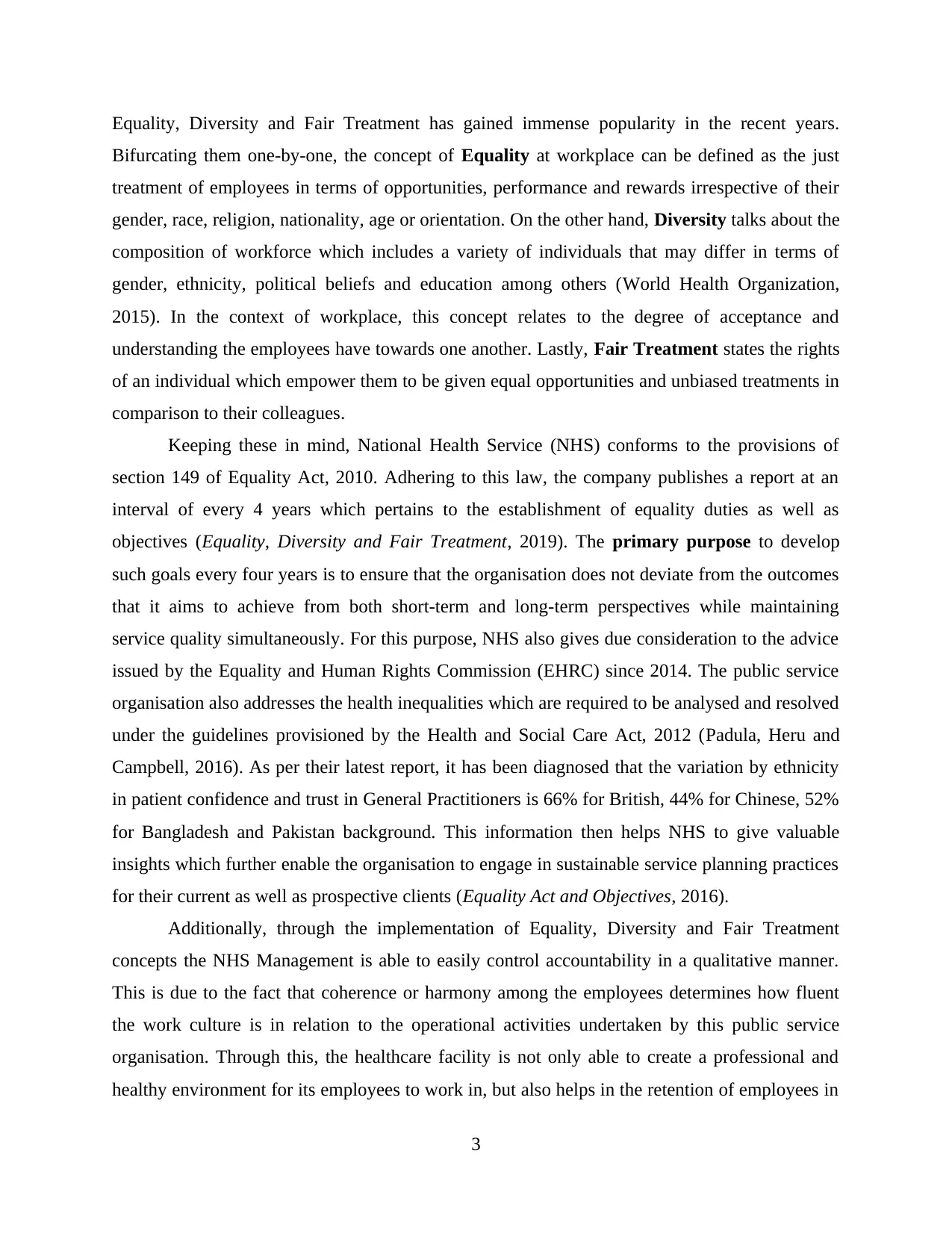
Equality, Diversity and Fair Treatment has gained immense popularity in the recent years.
Bifurcating them one-by-one, the concept of Equality at workplace can be defined as the just
treatment of employees in terms of opportunities, performance and rewards irrespective of their
gender, race, religion, nationality, age or orientation. On the other hand, Diversity talks about the
composition of workforce which includes a variety of individuals that may differ in terms of
gender, ethnicity, political beliefs and education among others (World Health Organization,
2015). In the context of workplace, this concept relates to the degree of acceptance and
understanding the employees have towards one another. Lastly, Fair Treatment states the rights
of an individual which empower them to be given equal opportunities and unbiased treatments in
comparison to their colleagues.
Keeping these in mind, National Health Service (NHS) conforms to the provisions of
section 149 of Equality Act, 2010. Adhering to this law, the company publishes a report at an
interval of every 4 years which pertains to the establishment of equality duties as well as
objectives (Equality, Diversity and Fair Treatment, 2019). The primary purpose to develop
such goals every four years is to ensure that the organisation does not deviate from the outcomes
that it aims to achieve from both short-term and long-term perspectives while maintaining
service quality simultaneously. For this purpose, NHS also gives due consideration to the advice
issued by the Equality and Human Rights Commission (EHRC) since 2014. The public service
organisation also addresses the health inequalities which are required to be analysed and resolved
under the guidelines provisioned by the Health and Social Care Act, 2012 (Padula, Heru and
Campbell, 2016). As per their latest report, it has been diagnosed that the variation by ethnicity
in patient confidence and trust in General Practitioners is 66% for British, 44% for Chinese, 52%
for Bangladesh and Pakistan background. This information then helps NHS to give valuable
insights which further enable the organisation to engage in sustainable service planning practices
for their current as well as prospective clients (Equality Act and Objectives, 2016).
Additionally, through the implementation of Equality, Diversity and Fair Treatment
concepts the NHS Management is able to easily control accountability in a qualitative manner.
This is due to the fact that coherence or harmony among the employees determines how fluent
the work culture is in relation to the operational activities undertaken by this public service
organisation. Through this, the healthcare facility is not only able to create a professional and
healthy environment for its employees to work in, but also helps in the retention of employees in
3
Bifurcating them one-by-one, the concept of Equality at workplace can be defined as the just
treatment of employees in terms of opportunities, performance and rewards irrespective of their
gender, race, religion, nationality, age or orientation. On the other hand, Diversity talks about the
composition of workforce which includes a variety of individuals that may differ in terms of
gender, ethnicity, political beliefs and education among others (World Health Organization,
2015). In the context of workplace, this concept relates to the degree of acceptance and
understanding the employees have towards one another. Lastly, Fair Treatment states the rights
of an individual which empower them to be given equal opportunities and unbiased treatments in
comparison to their colleagues.
Keeping these in mind, National Health Service (NHS) conforms to the provisions of
section 149 of Equality Act, 2010. Adhering to this law, the company publishes a report at an
interval of every 4 years which pertains to the establishment of equality duties as well as
objectives (Equality, Diversity and Fair Treatment, 2019). The primary purpose to develop
such goals every four years is to ensure that the organisation does not deviate from the outcomes
that it aims to achieve from both short-term and long-term perspectives while maintaining
service quality simultaneously. For this purpose, NHS also gives due consideration to the advice
issued by the Equality and Human Rights Commission (EHRC) since 2014. The public service
organisation also addresses the health inequalities which are required to be analysed and resolved
under the guidelines provisioned by the Health and Social Care Act, 2012 (Padula, Heru and
Campbell, 2016). As per their latest report, it has been diagnosed that the variation by ethnicity
in patient confidence and trust in General Practitioners is 66% for British, 44% for Chinese, 52%
for Bangladesh and Pakistan background. This information then helps NHS to give valuable
insights which further enable the organisation to engage in sustainable service planning practices
for their current as well as prospective clients (Equality Act and Objectives, 2016).
Additionally, through the implementation of Equality, Diversity and Fair Treatment
concepts the NHS Management is able to easily control accountability in a qualitative manner.
This is due to the fact that coherence or harmony among the employees determines how fluent
the work culture is in relation to the operational activities undertaken by this public service
organisation. Through this, the healthcare facility is not only able to create a professional and
healthy environment for its employees to work in, but also helps in the retention of employees in
3
⊘ This is a preview!⊘
Do you want full access?
Subscribe today to unlock all pages.

Trusted by 1+ million students worldwide
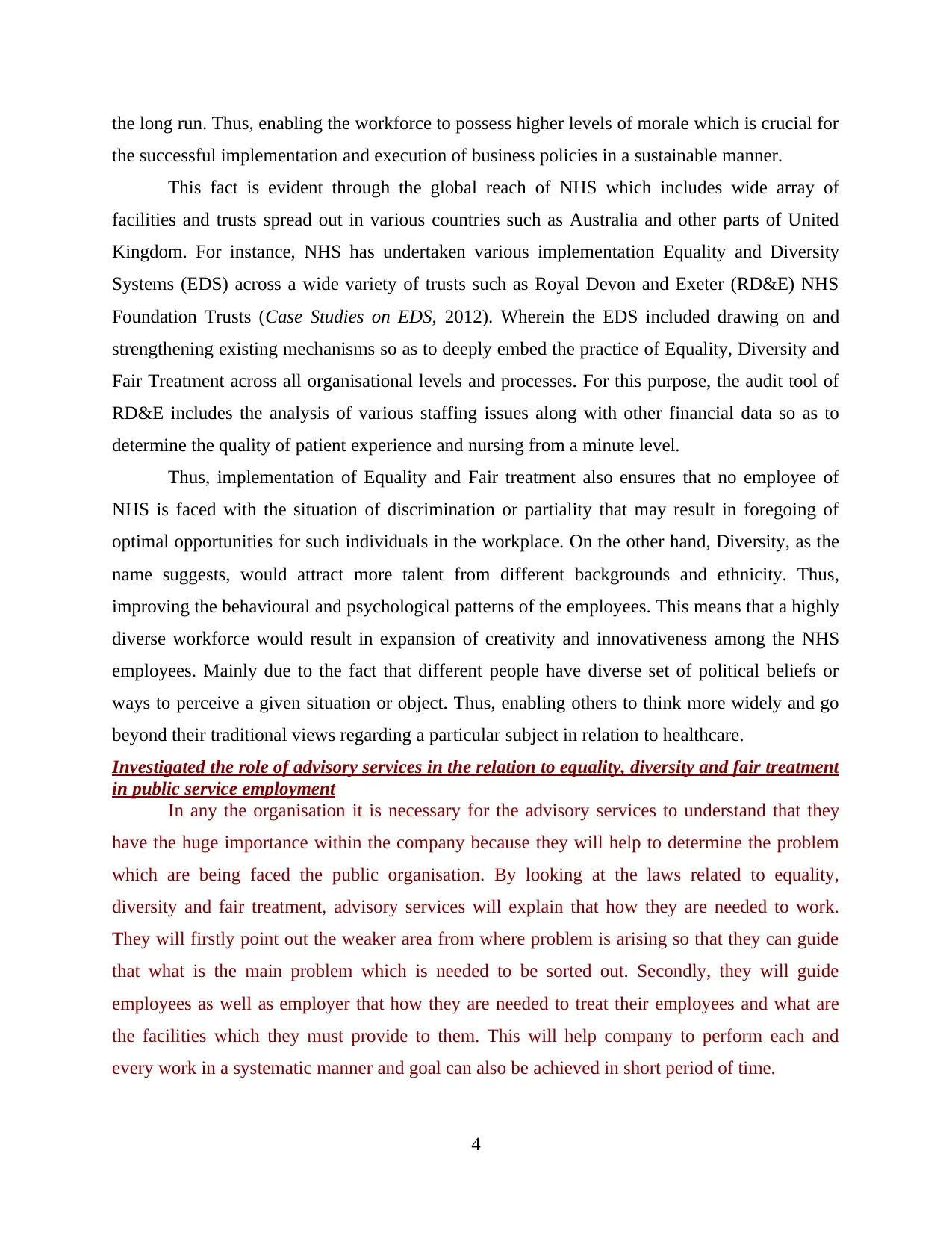
the long run. Thus, enabling the workforce to possess higher levels of morale which is crucial for
the successful implementation and execution of business policies in a sustainable manner.
This fact is evident through the global reach of NHS which includes wide array of
facilities and trusts spread out in various countries such as Australia and other parts of United
Kingdom. For instance, NHS has undertaken various implementation Equality and Diversity
Systems (EDS) across a wide variety of trusts such as Royal Devon and Exeter (RD&E) NHS
Foundation Trusts (Case Studies on EDS, 2012). Wherein the EDS included drawing on and
strengthening existing mechanisms so as to deeply embed the practice of Equality, Diversity and
Fair Treatment across all organisational levels and processes. For this purpose, the audit tool of
RD&E includes the analysis of various staffing issues along with other financial data so as to
determine the quality of patient experience and nursing from a minute level.
Thus, implementation of Equality and Fair treatment also ensures that no employee of
NHS is faced with the situation of discrimination or partiality that may result in foregoing of
optimal opportunities for such individuals in the workplace. On the other hand, Diversity, as the
name suggests, would attract more talent from different backgrounds and ethnicity. Thus,
improving the behavioural and psychological patterns of the employees. This means that a highly
diverse workforce would result in expansion of creativity and innovativeness among the NHS
employees. Mainly due to the fact that different people have diverse set of political beliefs or
ways to perceive a given situation or object. Thus, enabling others to think more widely and go
beyond their traditional views regarding a particular subject in relation to healthcare.
Investigated the role of advisory services in the relation to equality, diversity and fair treatment
in public service employment
In any the organisation it is necessary for the advisory services to understand that they
have the huge importance within the company because they will help to determine the problem
which are being faced the public organisation. By looking at the laws related to equality,
diversity and fair treatment, advisory services will explain that how they are needed to work.
They will firstly point out the weaker area from where problem is arising so that they can guide
that what is the main problem which is needed to be sorted out. Secondly, they will guide
employees as well as employer that how they are needed to treat their employees and what are
the facilities which they must provide to them. This will help company to perform each and
every work in a systematic manner and goal can also be achieved in short period of time.
4
the successful implementation and execution of business policies in a sustainable manner.
This fact is evident through the global reach of NHS which includes wide array of
facilities and trusts spread out in various countries such as Australia and other parts of United
Kingdom. For instance, NHS has undertaken various implementation Equality and Diversity
Systems (EDS) across a wide variety of trusts such as Royal Devon and Exeter (RD&E) NHS
Foundation Trusts (Case Studies on EDS, 2012). Wherein the EDS included drawing on and
strengthening existing mechanisms so as to deeply embed the practice of Equality, Diversity and
Fair Treatment across all organisational levels and processes. For this purpose, the audit tool of
RD&E includes the analysis of various staffing issues along with other financial data so as to
determine the quality of patient experience and nursing from a minute level.
Thus, implementation of Equality and Fair treatment also ensures that no employee of
NHS is faced with the situation of discrimination or partiality that may result in foregoing of
optimal opportunities for such individuals in the workplace. On the other hand, Diversity, as the
name suggests, would attract more talent from different backgrounds and ethnicity. Thus,
improving the behavioural and psychological patterns of the employees. This means that a highly
diverse workforce would result in expansion of creativity and innovativeness among the NHS
employees. Mainly due to the fact that different people have diverse set of political beliefs or
ways to perceive a given situation or object. Thus, enabling others to think more widely and go
beyond their traditional views regarding a particular subject in relation to healthcare.
Investigated the role of advisory services in the relation to equality, diversity and fair treatment
in public service employment
In any the organisation it is necessary for the advisory services to understand that they
have the huge importance within the company because they will help to determine the problem
which are being faced the public organisation. By looking at the laws related to equality,
diversity and fair treatment, advisory services will explain that how they are needed to work.
They will firstly point out the weaker area from where problem is arising so that they can guide
that what is the main problem which is needed to be sorted out. Secondly, they will guide
employees as well as employer that how they are needed to treat their employees and what are
the facilities which they must provide to them. This will help company to perform each and
every work in a systematic manner and goal can also be achieved in short period of time.
4
Paraphrase This Document
Need a fresh take? Get an instant paraphrase of this document with our AI Paraphraser
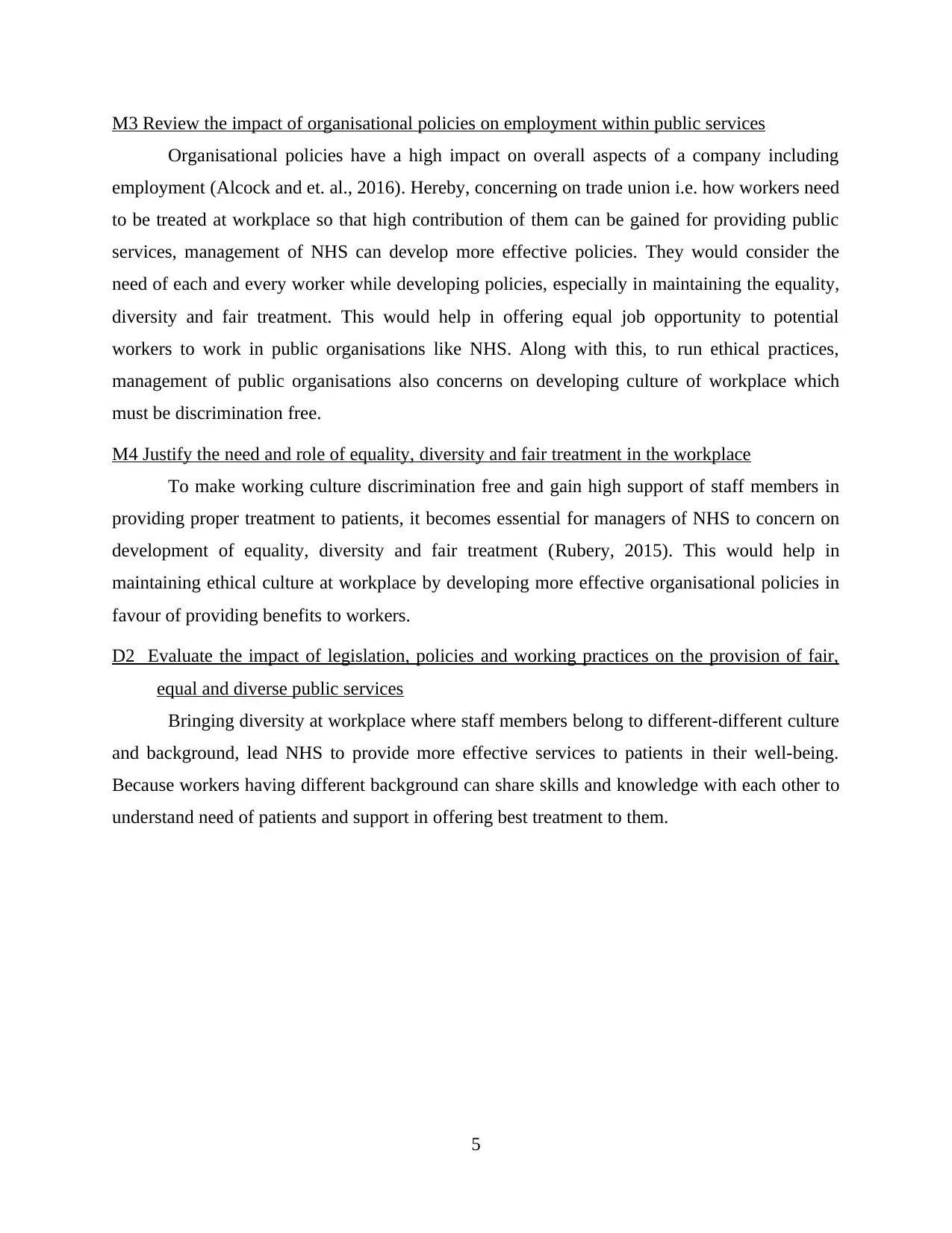
M3 Review the impact of organisational policies on employment within public services
Organisational policies have a high impact on overall aspects of a company including
employment (Alcock and et. al., 2016). Hereby, concerning on trade union i.e. how workers need
to be treated at workplace so that high contribution of them can be gained for providing public
services, management of NHS can develop more effective policies. They would consider the
need of each and every worker while developing policies, especially in maintaining the equality,
diversity and fair treatment. This would help in offering equal job opportunity to potential
workers to work in public organisations like NHS. Along with this, to run ethical practices,
management of public organisations also concerns on developing culture of workplace which
must be discrimination free.
M4 Justify the need and role of equality, diversity and fair treatment in the workplace
To make working culture discrimination free and gain high support of staff members in
providing proper treatment to patients, it becomes essential for managers of NHS to concern on
development of equality, diversity and fair treatment (Rubery, 2015). This would help in
maintaining ethical culture at workplace by developing more effective organisational policies in
favour of providing benefits to workers.
D2 Evaluate the impact of legislation, policies and working practices on the provision of fair,
equal and diverse public services
Bringing diversity at workplace where staff members belong to different-different culture
and background, lead NHS to provide more effective services to patients in their well-being.
Because workers having different background can share skills and knowledge with each other to
understand need of patients and support in offering best treatment to them.
5
Organisational policies have a high impact on overall aspects of a company including
employment (Alcock and et. al., 2016). Hereby, concerning on trade union i.e. how workers need
to be treated at workplace so that high contribution of them can be gained for providing public
services, management of NHS can develop more effective policies. They would consider the
need of each and every worker while developing policies, especially in maintaining the equality,
diversity and fair treatment. This would help in offering equal job opportunity to potential
workers to work in public organisations like NHS. Along with this, to run ethical practices,
management of public organisations also concerns on developing culture of workplace which
must be discrimination free.
M4 Justify the need and role of equality, diversity and fair treatment in the workplace
To make working culture discrimination free and gain high support of staff members in
providing proper treatment to patients, it becomes essential for managers of NHS to concern on
development of equality, diversity and fair treatment (Rubery, 2015). This would help in
maintaining ethical culture at workplace by developing more effective organisational policies in
favour of providing benefits to workers.
D2 Evaluate the impact of legislation, policies and working practices on the provision of fair,
equal and diverse public services
Bringing diversity at workplace where staff members belong to different-different culture
and background, lead NHS to provide more effective services to patients in their well-being.
Because workers having different background can share skills and knowledge with each other to
understand need of patients and support in offering best treatment to them.
5
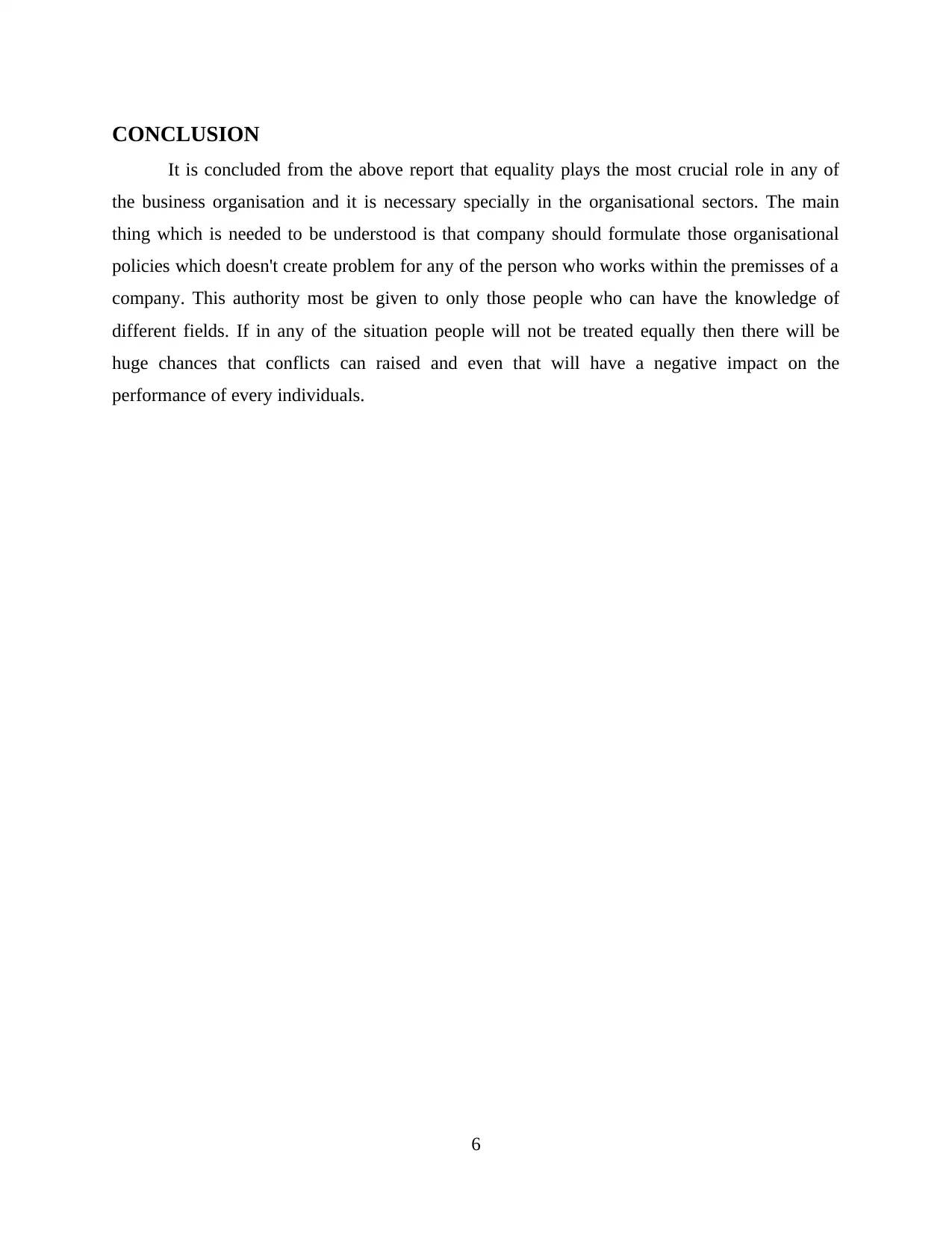
CONCLUSION
It is concluded from the above report that equality plays the most crucial role in any of
the business organisation and it is necessary specially in the organisational sectors. The main
thing which is needed to be understood is that company should formulate those organisational
policies which doesn't create problem for any of the person who works within the premisses of a
company. This authority most be given to only those people who can have the knowledge of
different fields. If in any of the situation people will not be treated equally then there will be
huge chances that conflicts can raised and even that will have a negative impact on the
performance of every individuals.
6
It is concluded from the above report that equality plays the most crucial role in any of
the business organisation and it is necessary specially in the organisational sectors. The main
thing which is needed to be understood is that company should formulate those organisational
policies which doesn't create problem for any of the person who works within the premisses of a
company. This authority most be given to only those people who can have the knowledge of
different fields. If in any of the situation people will not be treated equally then there will be
huge chances that conflicts can raised and even that will have a negative impact on the
performance of every individuals.
6
⊘ This is a preview!⊘
Do you want full access?
Subscribe today to unlock all pages.

Trusted by 1+ million students worldwide
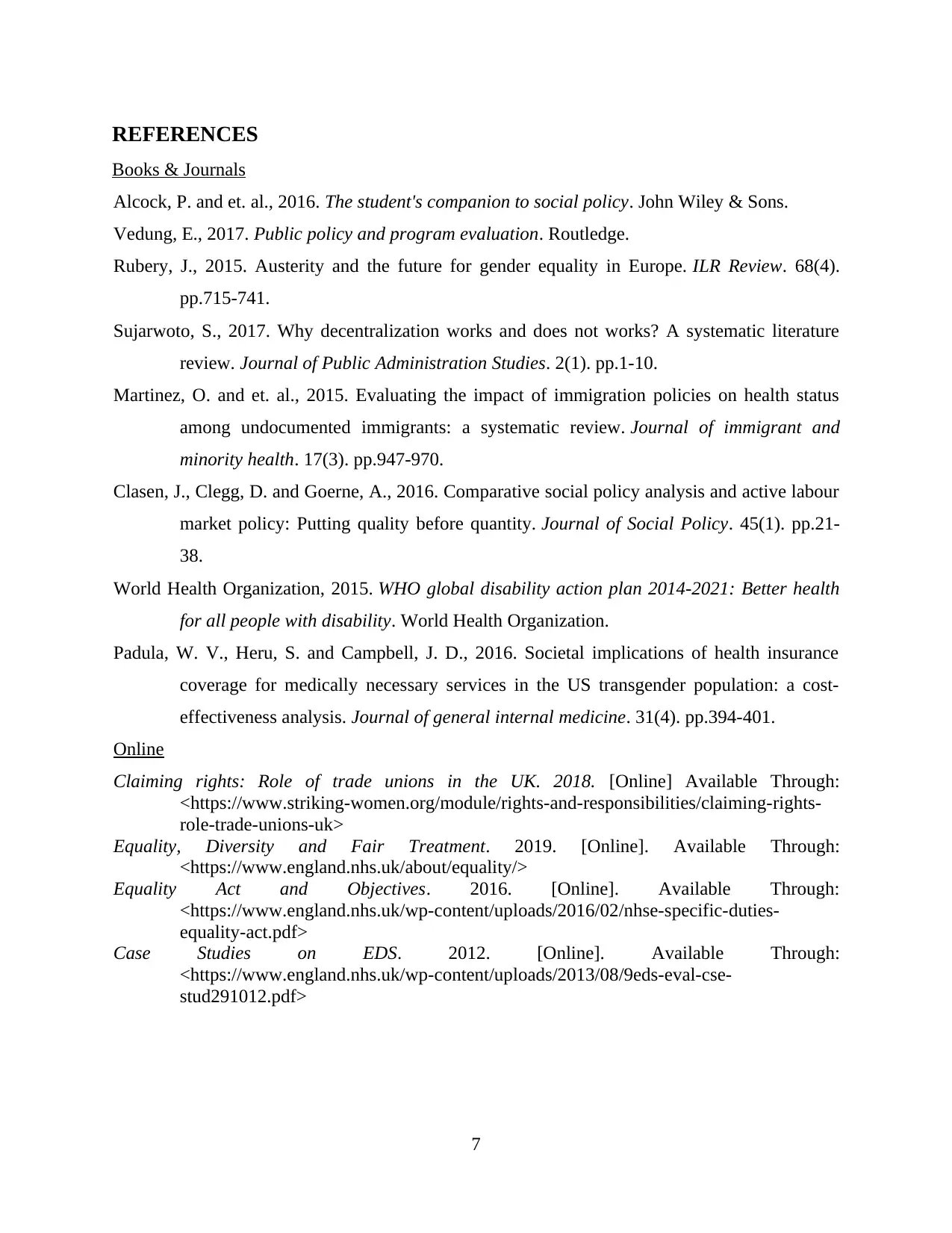
REFERENCES
Books & Journals
Alcock, P. and et. al., 2016. The student's companion to social policy. John Wiley & Sons.
Vedung, E., 2017. Public policy and program evaluation. Routledge.
Rubery, J., 2015. Austerity and the future for gender equality in Europe. ILR Review. 68(4).
pp.715-741.
Sujarwoto, S., 2017. Why decentralization works and does not works? A systematic literature
review. Journal of Public Administration Studies. 2(1). pp.1-10.
Martinez, O. and et. al., 2015. Evaluating the impact of immigration policies on health status
among undocumented immigrants: a systematic review. Journal of immigrant and
minority health. 17(3). pp.947-970.
Clasen, J., Clegg, D. and Goerne, A., 2016. Comparative social policy analysis and active labour
market policy: Putting quality before quantity. Journal of Social Policy. 45(1). pp.21-
38.
World Health Organization, 2015. WHO global disability action plan 2014-2021: Better health
for all people with disability. World Health Organization.
Padula, W. V., Heru, S. and Campbell, J. D., 2016. Societal implications of health insurance
coverage for medically necessary services in the US transgender population: a cost-
effectiveness analysis. Journal of general internal medicine. 31(4). pp.394-401.
Online
Claiming rights: Role of trade unions in the UK. 2018. [Online] Available Through:
<https://www.striking-women.org/module/rights-and-responsibilities/claiming-rights-
role-trade-unions-uk>
Equality, Diversity and Fair Treatment. 2019. [Online]. Available Through:
<https://www.england.nhs.uk/about/equality/>
Equality Act and Objectives. 2016. [Online]. Available Through:
<https://www.england.nhs.uk/wp-content/uploads/2016/02/nhse-specific-duties-
equality-act.pdf>
Case Studies on EDS. 2012. [Online]. Available Through:
<https://www.england.nhs.uk/wp-content/uploads/2013/08/9eds-eval-cse-
stud291012.pdf>
7
Books & Journals
Alcock, P. and et. al., 2016. The student's companion to social policy. John Wiley & Sons.
Vedung, E., 2017. Public policy and program evaluation. Routledge.
Rubery, J., 2015. Austerity and the future for gender equality in Europe. ILR Review. 68(4).
pp.715-741.
Sujarwoto, S., 2017. Why decentralization works and does not works? A systematic literature
review. Journal of Public Administration Studies. 2(1). pp.1-10.
Martinez, O. and et. al., 2015. Evaluating the impact of immigration policies on health status
among undocumented immigrants: a systematic review. Journal of immigrant and
minority health. 17(3). pp.947-970.
Clasen, J., Clegg, D. and Goerne, A., 2016. Comparative social policy analysis and active labour
market policy: Putting quality before quantity. Journal of Social Policy. 45(1). pp.21-
38.
World Health Organization, 2015. WHO global disability action plan 2014-2021: Better health
for all people with disability. World Health Organization.
Padula, W. V., Heru, S. and Campbell, J. D., 2016. Societal implications of health insurance
coverage for medically necessary services in the US transgender population: a cost-
effectiveness analysis. Journal of general internal medicine. 31(4). pp.394-401.
Online
Claiming rights: Role of trade unions in the UK. 2018. [Online] Available Through:
<https://www.striking-women.org/module/rights-and-responsibilities/claiming-rights-
role-trade-unions-uk>
Equality, Diversity and Fair Treatment. 2019. [Online]. Available Through:
<https://www.england.nhs.uk/about/equality/>
Equality Act and Objectives. 2016. [Online]. Available Through:
<https://www.england.nhs.uk/wp-content/uploads/2016/02/nhse-specific-duties-
equality-act.pdf>
Case Studies on EDS. 2012. [Online]. Available Through:
<https://www.england.nhs.uk/wp-content/uploads/2013/08/9eds-eval-cse-
stud291012.pdf>
7
1 out of 10
Related Documents
Your All-in-One AI-Powered Toolkit for Academic Success.
+13062052269
info@desklib.com
Available 24*7 on WhatsApp / Email
![[object Object]](/_next/static/media/star-bottom.7253800d.svg)
Unlock your academic potential
Copyright © 2020–2025 A2Z Services. All Rights Reserved. Developed and managed by ZUCOL.




